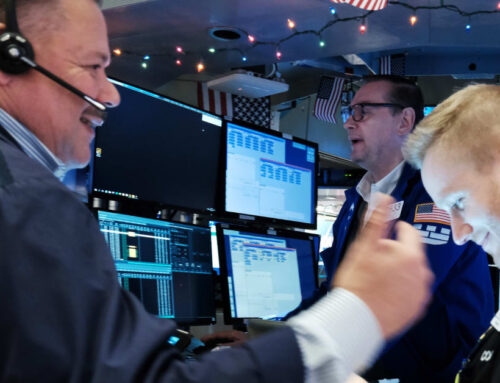Halfway there
January 7, 2025
The writer and podcaster Richard Osman celebrated the New Year with an observation designed to devastate anyone old enough to remember the 1980s. “‘Wake Me Up Before You Go Go’ by Wham was released nearer to the end of the Second World War than to today,” he posted on social media. “Happy New Year everyone!”
It’s a fun game that becomes low-key terrifying when applied to climate change and the world’s ever more urgent emissions targets. For example, Tony Blair’s election victory is now substantially further away than the point at which the world’s industrialised economies should deliver on their net zero goals for mid-century. We are as close to the start of the Covid pandemic as we are to the point by which the UK is meant to have built a clean power system and ended the sale of petrol and diesel cars. ‘Wake Me Up Before You Go Go’ is 41 years old. In 41 years’ time the vast majority of the global economy needs to be completely decarbonised if there is to be any chance of keeping temperature increases below the 2C threshold set by the Paris Agreement.
Somehow a quarter of the 21st century is gone. With each passing year the projections suggesting the world is on track for around 3C of warming by 2100 – and all the catastrophic risks that come with it – are set to become a matter not of hypothetical scenario, but of lived reality for millions more young people. Every year is now precisely four per cent of the remaining available time for industrialised economies to reach net zero. Each quarter will see one per cent more of that time trickle away.
There are grounds for optimism in this perspective. A huge amount has changed in the past quarter century. Even more has changed since Wham were at their chart-topping peak. There’s an interesting debate over whether more changed between D Day and Wham’s imperial phase than changed in the period between the early 80s and the present day. Is the pace of technological and cultural change slowing, accelerating, or staying broadly constant? But it remains the case that we tend to over estimate the scale of change in any given year and underestimate the level of historic transformation possible over a decade or two. Technology revolutions, policy changes, and cultural trends that we now take completely for granted have changed much of the world beyond recognition – and I’m not just talking about the haircuts.
Last year, renewables generation set fresh records all around the world. Fossil fuels’ share of the electricity mix is plummeting in multiple key markets. Contrary to reports, the EV sector is booming. Energy systems and clean tech markets are transforming before our eyes. It is entirely plausible that the next 25 years could see one of the most rapid and consequential technological and economic revolutions in human history. President Trump and his climate denialist cult could become little more than a sorry footnote as a series of global mega-trends reshape global geopolitics.
But equally, if such an upbeat scenario is to come to pass it is increasingly clear the clean energy transition needs to get a move on.
Just before Christmas, the International Energy Agency published a quietly traumatising update confirming it expects global coal demand to have risen again in 2024. The world is adding lots more clean energy capacity, but it also keeps burning more fossil fuels. Hopes *this* could be the year that global emissions peak keep being deferred, as a mix of energy security concerns, policy failures, economic growth in emerging markets, and continued fossil fuel investments drive coal, oil, and gas demand ever upwards. The Trump administration threatens to make this grave situation even worse.
Against what is a confusing and contradictory backdrop many corporates will this year be tasked with re-assessing their climate strategies, either because the Trump-led backlash against climate action demands a response or because emissions targets for 2025 are set to lapse and new goals are required. How should businesses and investors prepare for what is shaping up to be a critical year for global climate action?
There are three big picture considerations that are worth keeping in mind.
The first is that there is no business as usual to retreat towards. Climate change and decarbonisation are not a zero sum game. If, as seems increasingly likely, the 1.5C and then the 2C warming threshold are breached in the coming decades then businesses need to prepare for a very different world. There will need to be a huge increase in investment in climate resilience, entire industries will find themselves under threat, and geopolitics will become even more volatile than it has proved during the first quarter of the 21st century. Everyone should be preparing for this daunting future.
The second is that if the world is to stop the climate spiralling fully out of control net zero is not some arbitrary target or political slogan, but rather a clear scientific necessity. As such there is an increasingly urgent need for carbon removal capacity that can first deliver on net zero targets and then create a negative emissions scenario that could over time bring the 1.5C temperature goal back into play. As Ember’s Richard Black argued in a recent post, even if the 1.5C threshold is breached that does not mean the goal should be abandoned. The nascent carbon removals industry may be treated with suspicion by much of the environmental movement – sometimes with good reason – but it has a critical role to play over the next 25 years and beyond.
And finally, and most importantly, this is not the time to dilute or deprioritise decarbonisation efforts. As I argued in a long essay last month under the headline ‘Climate change isn’t ‘woke”, the economic and political case for bolder climate action is more compelling than ever. Scaling back emissions targets or delaying green investments in a doomed attempt to appease populist rabble-rousers will do next to nothing to reduce energy costs or win over voters. But it will badly undermine economic and energy security, while guaranteeing a century of rolling climate crises and eroding competitiveness as the global clean energy transition inevitably accelerates. Happy New Year everyone!
The next 12 months promises to be hugely challenging, but those companies that remain committed to climate action have no choice but to keep on keeping on. Time may be slipping by, as it always does, but important progress can and is still being made. The industrialised world is half way to the net zero targets it set itself. It’s all still to play for.
A version of this article first appeared as part of BusinessGreen’s Overnight Briefing email, which is available to all BusinessGreen Intelligence members.
A version of this article first appeared as part of BusinessGreen’s Overnight Briefing email, which is available to all BusinessGreen Intelligence members.
A version of this article first appeared as part of BusinessGreen’s Overnight Briefing email, which is available to all BusinessGreen Intelligence members.
A version of this article first appeared as part of BusinessGreen’s Overnight Briefing email, which is available to all BusinessGreen Intelligence members.
A version of this article first appeared as part of BusinessGreen’s Overnight Briefing email, which is available to all BusinessGreen Intelligence members.
Search
RECENT PRESS RELEASES
Related Post



